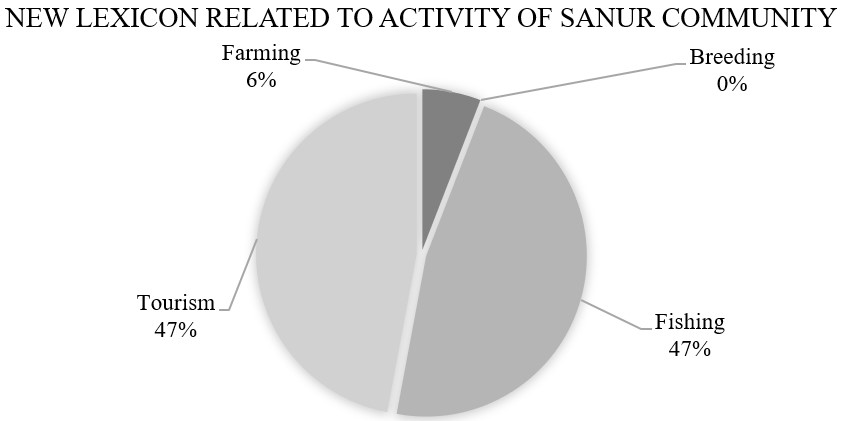The Dynamics of Balinese Lexicon in Sanur Tourism Area: An Ecolinguistic Approach
Abstract
Ecolinguistics has been the research interest for many linguists in recent years. However, ecolinguitic researches in Indonesia are still concerned on examining the lexicon in one particular field. For this reason, this study aims to examine the lexicon treasures found in tourism area of Sanur. This is chosen as the object of this research as the tourism area is most at risk of being exposed to globalization due to tourism developments. The flow of globalization due to the development of information technology and tourism can change behavior, social attitudes or social life of the society, and the biological environment of the area as well. Based on the research results, it was found that the lexicons used by the Sanur community are not only lexicons that have a physical form or an activity, but there are also some lexicons that only refer to the concept (abstract) without finding the objects or physical activities referred to by these lexicons. The people of Sanur also feel that in the early development of tourism in the area there was still a balance between the environment and the needs of tourism.
Downloads
References
Baru, Y. (2016). Leksikon nama orang pada Etnis Miyah: Kajian ekolinguistik. Kibas Cenderawasih, 13(1), 43-50.
Fill, A., & Muhlhausler, P. (2001). The Ecolinguistics Reader: Language, Ecology and Environment. London: Continum.
Genua, V. (2016). Khazanah Leksikon Tanaman Pangan Etnik Nagakeo : Kajian Ekolinguistik. In Simposium Internasional Bahasa-Bahasa Lokal, Nasional dan Global.
Nahak, M. M. N., Simpen, I. W., Yadnya, I. B. P., & Satyawati, N. M. S. (2019). Lexicon in Batar Text: Ecolinguistics View. International Journal of Linguistics, Literature and Culture, 5(6), 48-59. https://doi.org/10.21744/ijllc.v5n6.763
Rajistha, I. G. N. A. (2016). Beblabadan Bahasa Bali dalam Perspektif Ekolinguistik. RETORIKA: Jurnal Ilmu Bahasa, 2(1), 79-94. https://doi.org/10.22225/jr.2.1.223.79-94
Ramadan, D. A. (2020). Disappearance of the Nile: Storytelling and environmental awareness. Language & Ecology.
Septevany, E., Dyah, W., Darlina, L., & Rosbaedi. (2019). Khazanah Leksikon Kepadian Sawah Komunitas Tutur Sunda: Kajian Ekolinguistik. Seminar Riset Linguistik Pengajaran Bahasa, 3, 8-17.
Sudaryanto. (1993). Metode dan Teknik Analisis Bahasa. Yogyakarta: Duta Wacana University Press.
Suktiningsih, W. (2016). Leksikon Fauna Masyarakat Sunda: Kajian Ekolinguistik. RETORIKA: Jurnal Ilmu Bahasa, 2(1), 142-160. https://doi.org/10.22225/jr.2.1.54.142-160
Tarigan, B., Setia, E., Widayati, D., & Mbete, A. M. (2016). Language Maintenance and Shift of Flora’s Lexicons in Karonese Traditional Food: An Ecolinguistic Perspective. Communication and Linguistics Studies, 2(1), 13-17.
Tualaka, D. (2016). Bentuk Khazanah Ekoleksikon Pertanian Bahasa Waijewa. MELANESIA: Jurnal Ilmiah Kajian Sastra Dan Bahasa, 1(1), 105-113. https://doi.org/10.30862/jm.v1i1.742
Yuniawan, T., Rokhman, F., & Zulaeha, I. (2020). Eco-linguistic Analysis on Flora and Fauna Lexicons on the Motifs of Batik Pekalongan, Indonesia. International Journal of Advanced Science and Technology, 29(5), 6549-6566.
Yuniawan, T., Rokhman, F., Rustono, & Mardikantoro, H. B. (2018). Eco-Lexicons in Conservation News Text in Mass Media: Ecolinguistics Study. The Journal of Educational Development, 6(1), 1-15.


This work is licensed under a Creative Commons Attribution 4.0 International License.
Copyright for this article is retained by the author(s), with first publication rights granted to the journal.
This is an open-access article distributed under the terms and conditions of the Creative Commons Attribution license (http://creativecommons.org/licenses/by/4.0/).









1.png)









1.png)











